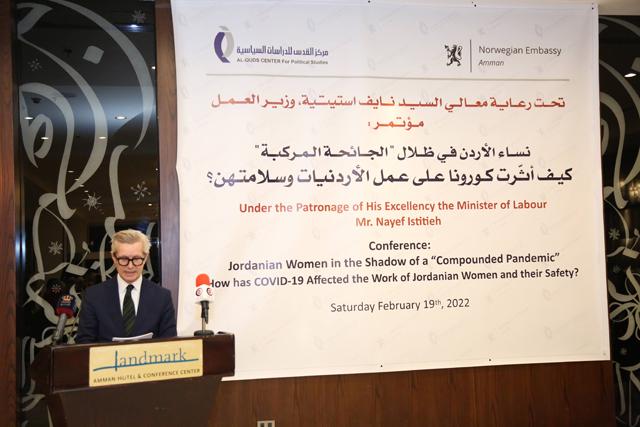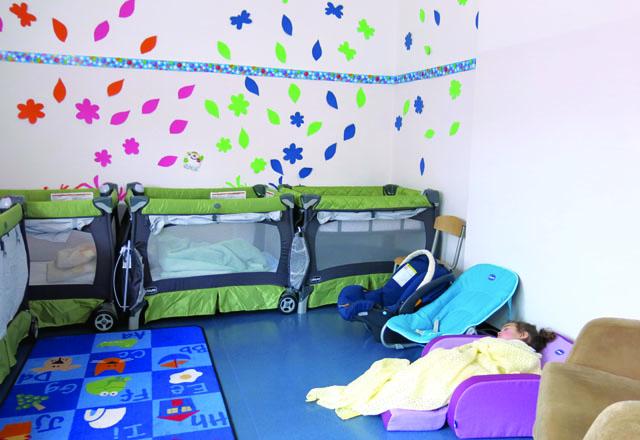You are here
Study highlights women’s struggles amid pandemic
By Batool Ghaith - Feb 19,2022 - Last updated at Feb 19,2022

Norway’s Ambassador to Jordan Espen Lindbæck speaks during the launch of a study in Amman on Saturday (Photo courtesy of Al Quds Centre for Political Studies)
AMMAN — Al Quds Centre for Political Studies launched a new study titled “Jordanian Women in the Shadow of a Compounded Pandemic” on how COVID-19 has affected the work of Jordanian women and their safety in the workplace.
In collaboration with the Embassy of Norway in Amman, the centre discussed the results of the study on Saturday.
Norway’s Ambassador to Jordan Espen Lindbæck, deputising for the Minister of Labour Aoun Al Nahar, director of the directorate of employment at the Ministry, and representatives from different sectors and female activists attended the event.
“We are facing a complex crisis, where all Jordanians have suffered from the pandemic, however, the situation of women in particular is more vulnerable to the psychological, economic, social and educational repercussions,” the centre’s director Oraib Rantawi said in his opening remarks.
Rantawi noted that the study focuses on the effects of the pandemic on female employers and employees in the private sector, in all the Kingdom’s governorates.
“The conditions that female workers in the public sector were subjected to were almost identical to the private sector. However, there are some outcomes that did not affect female workers in the public sector, such as unemployment and the reduction of basic salaries,” he noted.
Rantawi described the pandemic as a “disaster” for women, as domestic violence against women in Jordan increased 33 per cent during the first period of lockdowns.
Lindbæck noted that the pandemic has presented new challenges and forced the world to work in a new manner.
The ambassador praised the Jordanian government’s efforts to fight the pandemic despite economic difficulties, instability and conflict in the region, as well as the ongoing challenge of hosting a large refugee population.
“The pandemic had an immediate effect on women’s employment,” said the ambassador, noting that according to the study one in three working women in Jordan has lost their jobs and others who were able to keep theirs have seen significantly reduced wages.
Lindbæck noted that creating equal job opportunities for women is “critical” as the sectors most affected by the pandemic consist of mainly female workers.
“Across the globe, the gender effects of the pandemic have been an important reminder that gender equality is a work in process and have also highlighted the need to account for gender when preparing and responding to crisis,” Lindbæck added.
He stressed the importance of including a “gender perspective” in the government’s strategies to build back from the pandemic.
The study focused on different aspects of the impact of the pandemic including basic social requirements, economic impact, domestic violence, emotional health and harassment in the work environment.
According to the study, 71 per cent of female workers in the private sector receive a monthly salary of JD350 or less. Moreover, 33 per cent receive salaries below the minimum wage (JD260), which is higher in the north of the Kingdom (43 per cent).
The study showed that 39 per cent of female workers in the private sector contribute fully to covering the household expenses, with a higher rate in the northern region (44 per cent).
The study indicated that 68 per cent of private businesses for women are licensed and only 8 per cent of women’s businesses are companies with more than one partner or shareholder.
The group most affected by housing instability has been female workers in the central region, as four to five per cent lost housing and had to stay with a family member. Five to seven per cent had to move into cheaper housing and roughly a third spent their savings on rent, according to the study.
Five per cent of female workers have completely lost their jobs due to the pandemic, and 17.2 per cent of self-employed women completely shut down their businesses, the study reported.
The study concluded with a number of recommendations to protect women in the workforce, such as restricting workers’ access to one payment and to provide an alternative to cover the urgent need for liquidity in addition to opening the way for re-subscription within easy terms and without financial consequences.
Related Articles
AMMAN — The International Labour Organisation (ILO) has published a legal gap analysis in a bid to work on a legislative framework con
The Jordanian National Commission for Women (JNCW) on Monday sent a memo to the government demanding the establishment of crèches in public sector institutions.
The Phenix Centre for Economic and Informatics Studies on Saturday called for developing workplace conditions in Jordan to attract more women to the job market.
















